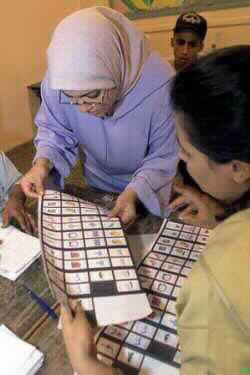Morocco's socialists emerged as favorites Sunday to lead a new coalition government, but they and other parties rejected any alignment with an Islamic party that gained strength in the election. Morocco faced a period of uncertainty as political parties pieced together a coalition from the fractured political map that emerged after Friday's parliamentary elections. A dizzying 26 parties participated and most secured seats.
Preliminary results gave the socialists of Abderrahmane Youssoufi, the incumbent prime minister, an early lead, with 45 seats. In all, the seven parties that formed the previous coalition had 167 of the 295 seats for which the government announced results late Sunday. That would give them a slim majority if they ally again.
It remained unclear when results for the remaining 30 seats in the lower house - reserved for women - would be known. The quota was introduced to give women more say. The last parliament had just two women.
The turnout was a "very honorable" 52 percent, Interior Minister Driss Jettou said. The elections, the first since King Mohammed VI ascended the throne in 1999, were a foundation for "the new culture of liberty, democracy and human rights" the king seeks for Morocco, Jettou said.
In a measure of strengthening Islamic sentiment in this moderate Muslim-Arab North African nation, a party with leaders who want to implement Islamic law in Morocco won at least 38 seats. That more than doubled the 14 seats they previously held.
Some members of the Justice and Development Party, known as the PJD, want Sharia laws implemented.
The socialists and other parties said PJD would not be welcome in a coalition.
After years of rigged elections, the government pledged that Friday's polling would be free and fair. Despite scattered cases of election violence and other irregularities, many voters, candidates and parties agreed that the poll marked a major step in a democratic transition for Morocco.
That sentiment was echoed by France, Morocco's former colonial ruler, which hailed the "transparency of the vote."
The election "was honest, clean and really opens the road for democracy," said Nabil Benabdallah, campaign director and spokesman for the Party of Progress and Socialism. It had at least nine seats and Benabdallah said it expected to be in the new coalition.
PHOTO CAPTION
The president of the polling station number 165 at the Mohammed VI college in Casablanca, left, inspects, along with an election official, a ballot paper as they are counting votes, late Friday, Sept. 27, 2002. (AP Photo/Jalil Bounhar)
- Author:
& News Agencies - Section:
WORLD HEADLINES


 Home
Home Discover Islam
Discover Islam Quran Recitations
Quran Recitations Lectures
Lectures
 Fatwa
Fatwa Articles
Articles Fiqh
Fiqh E-Books
E-Books Boys & Girls
Boys & Girls  Hajj Rulings
Hajj Rulings Hajj Fatwas
Hajj Fatwas














